The Last Tango In Paris Controversy Explained
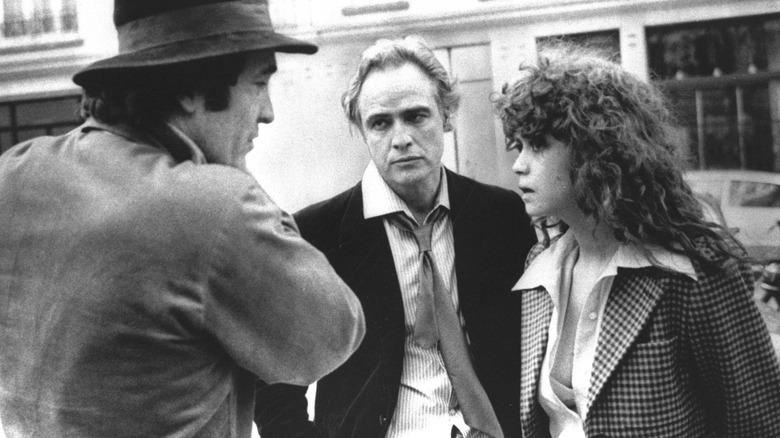
Content warning: The following article contains descriptions of rape and sexual assault.
Directed by Bernardo Bertolucci, "Last Tango in Paris" is a haunting erotic drama about grief and disconnection starring Marlon Brando and Maria Schneider. The story centers on Paul, a middle-aged widower, and a young girl named Jeanne who engage in an intense yet detached sexual relationship where they do not even know each other's names. Acting titan Brando was forty-eight at the time of filming alongside the nineteen-year-old newcomer Schneider in what would become her most notorious role.
"Last Tango in Paris" is an esoteric film that alternates between long-winded soliloquies and illicit moments, but there was one salacious scene in particular that caused the most controversy. Pauline Kael wrote in her New Yorker review that "Bertolucci achieves realism with the terror of actual experience still alive on the screen," but the director took this authenticity too far, creating a terrifying real-life encounter that would disturb and humiliate one of his stars.
There Was Sexually Explicit Material
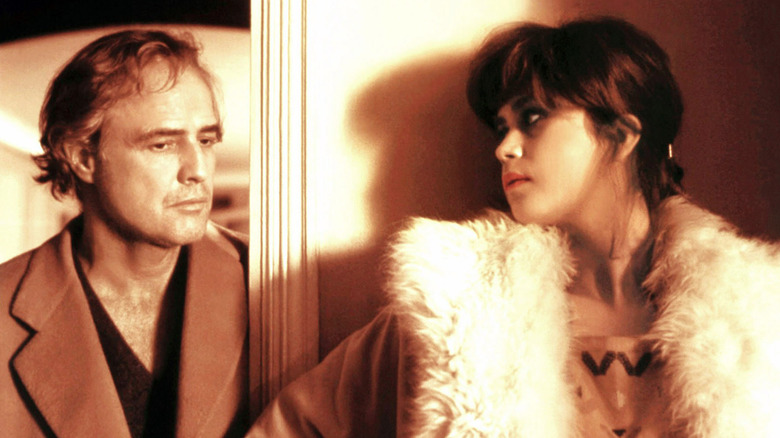
"Last Tango in Paris" initially received an X rating — an MPAA classification that was often a death sentence for filmmakers because it limited the exhibition of their film. It was banned in several countries, including Bertolucci's own Italy, where he was also charged with obscenity.
The overwhelming critical contention was pointed towards a particularly graphic rape scene. Although Paul harbors a passionate desire for Jeanne, their sexual relationship is quite complex and he is often cruel and aggressive. In the infamous and controversial sequence, Paul uses butter as a lubricant to anally rape Jeanne. The scene goes on for an uncomfortable length of time, alternating between cold, distant shots of Paul on top of Jeanne's bare lower body and painfully close shots of her horrified reaction. Paul grips her head with tight force and seething anger while Jeanne sobs uncontrollably. It is a truly unsettling moment.
Maria Schneider Felt Violated During Filming
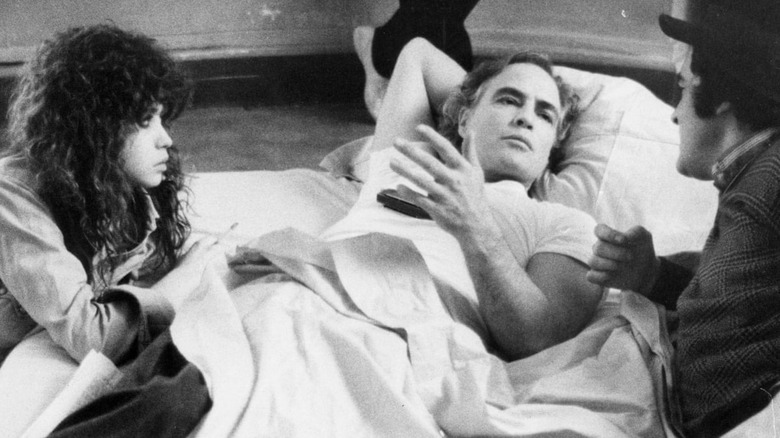
In 2007, Schneider told the Daily Mail that the butter scene was not in the original script but something devised by Brando moments before filming. She was angry but too afraid to speak up against the seasoned filmmakers. "I should have called my agent or had my lawyer come to the set because you can't force someone to do something that isn't in the script, but at the time, I didn't know that," she remarked. Both Bertolucci and Brando took advantage of her youth and inexperience to force her into spontaneously performing a sexually violent scene. Schneider continued to speak out on her mortifying experience:
"Marlon said to me: 'Maria, don't worry, it's just a movie,' but during the scene, even though what Marlon was doing wasn't real, I was crying real tears. I felt humiliated and to be honest, I felt a little raped, both by Marlon and by Bertolucci. After the scene, Marlon didn't console me or apologize. Thankfully, there was just one take."
Schneider was also overwhelmed by the public reaction to the film, not only the controversy surrounding the sexually explicit material but how audiences dismissed her as a serious actress to fetishize her as a sex symbol instead. In response, Schneider never did nude scenes again. The pressure of her newfound fame led Schneider into a spiral of drug use and suicide attempts, eventually getting clean in 1980. Despite starring in numerous other films, she could never escape the shadow of "Last Tango in Paris."
The #MeToo Movement Drew Criticism To The Scene
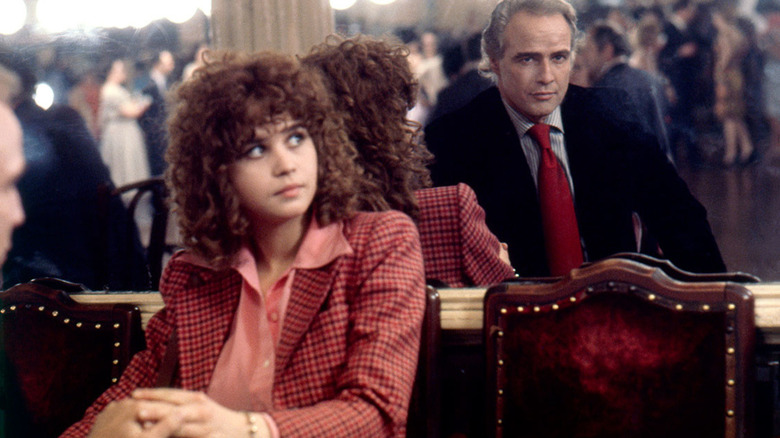
The rape scene received new criticism in 2016 when the Spanish nonprofit El Mundo de Alycia posted unseen footage of Bertolucci speaking about "Last Tango in Paris" in honor of International Day for the Elimination of Violence Against Women. The director acknowledged that the use of butter was a last minute addition that he and Brando willingly withheld from Schneider because they wanted her to have an authentic onscreen reaction. "I wanted her to react humiliated ... I wanted Maria to feel, not to act," he said; he also wanted her to respond as a "girl, not an actress." Bertolucci insisted that he had no regrets about the way he shot the scene.
Both Bertolucci and Brando knowingly wielded their power and authority as older, seasoned male professionals to manipulate a young actress for the sake of "art." Several actors on Twitter reacted to these appalling revelations of workplace abuse. Jessica Chastain wrote, "To all the people that love this film -- you're watching a 19yr old get raped by a 48yr old man. The director planned her attack. I feel sick." Chris Evans responded, "Wow. I will never look at this film, Bertolucci or Brando the same way again. This is beyond disgusting. I feel rage."
The Misogynistic Legacy Of Last Tango In Paris
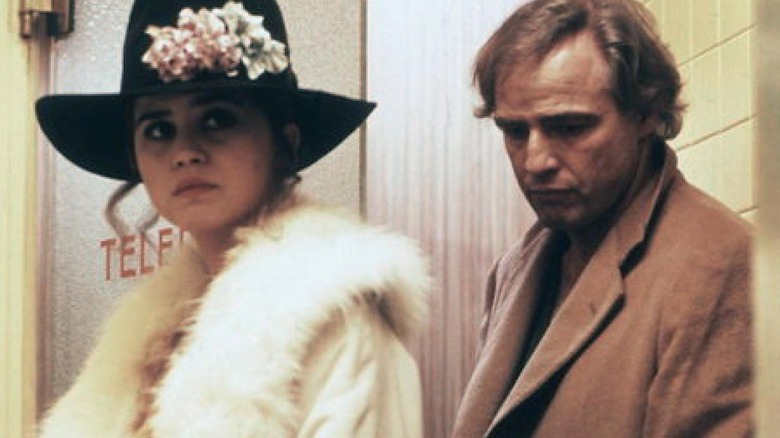
The #MeToo movement has brought to light the inequitable power dynamics of the filmmaking industry and numerous past on-set violations such as "Last Tango in Paris." This has led to the inception of intimacy coordinators, designated workers who act as a liaison between actors and production for nudity and simulated sex scenes to create a safe working environment. These kind of workers can help assure that Schneider's situation never happens again.
The controversy surrounding Last Tango in Paris calls attention to the fair treatment of actors, especially when having to perform scenes of a sexual or violent nature. We need to stop romanticizing method-style acting (that Brando was famous for), and the idea that the actual humans behind the role must be having a lived-in traumatizing experience in order to attain their best performance. Artistic achievement should not be tied genuine psychological torture. Bertolucci and Brando should have respected Schneider as an actress and entrusted that she would get to that emotional place without any humiliating tactics. By blurring the lines between personal and professional life for their own sexist pleasure, Bertolucci and Brando's cruel actions led to Schneider's mental and emotional trauma. It is difficult to view "Last Tango in Paris" without being a participant in Schneider's real-life sexual humiliation, and one should consider whether or not Bertolucci's drama deserves to be recognized in light of her harrowing experience.
Read this next: The 14 Best Directorial Debuts From Actors Ranked
The post The Last Tango in Paris Controversy Explained appeared first on /Film.
from /Film https://ift.tt/3qLBoz2
No comments: